#mixed representation
Explore tagged Tumblr posts
Text

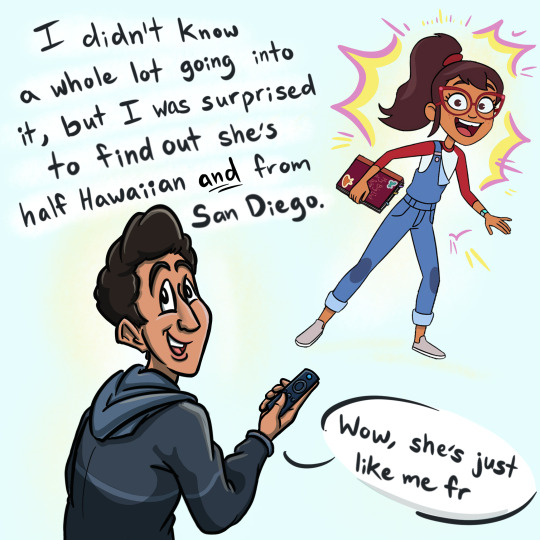
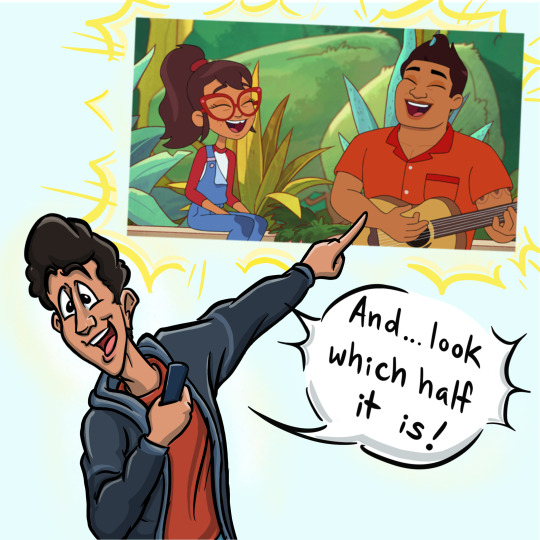
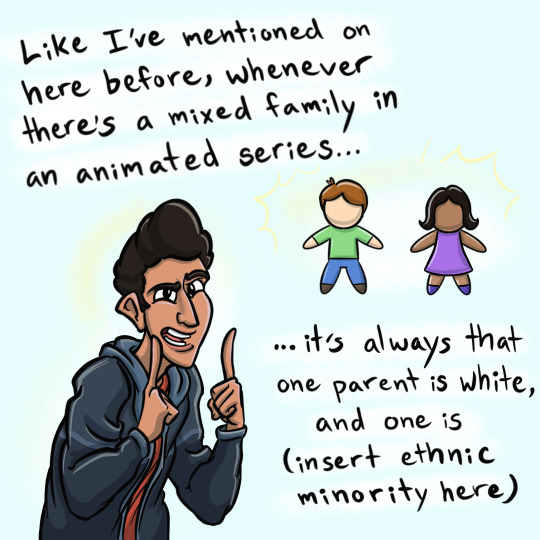
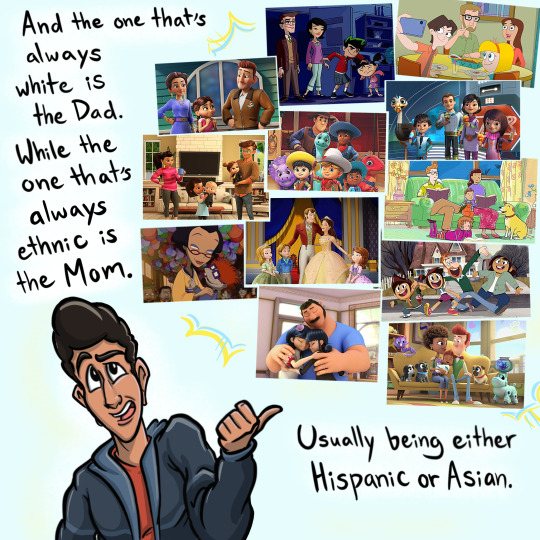


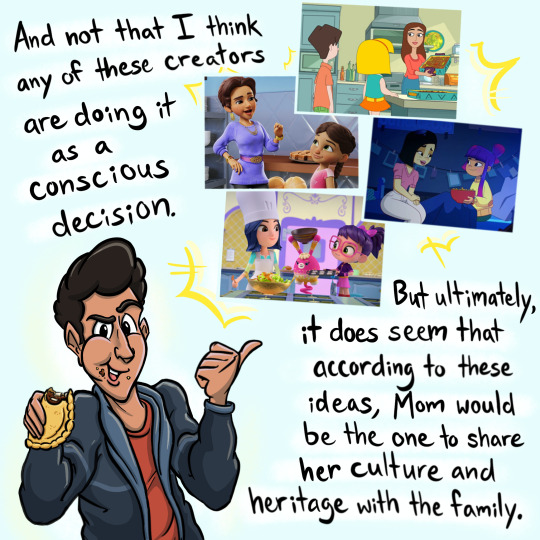
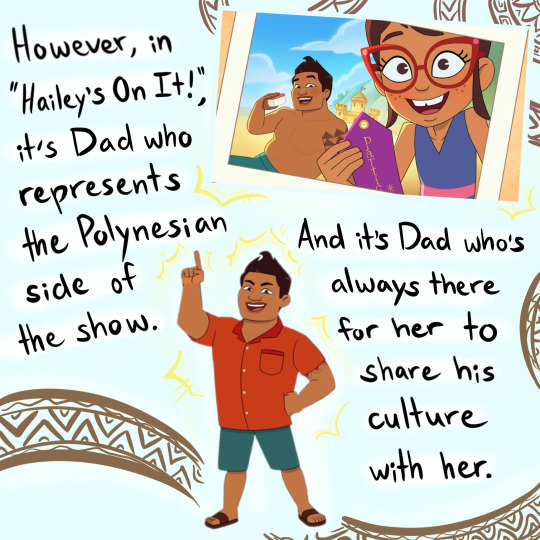

Names of the series I have pictured here:
Panel 6 and 8 — American Dragon: Jake Long (2005), Hamster and Gretel (2022), The Rocketeer (2019), Dino Ranch (2021), Miles from Tomorrowland (2015), The Boss Baby: Back in the Crib (2022), Sofia the First (2012), Martha Speaks (2009), Rugrats (2001), Miraculous: Tales of Ladybug and Cat Noir (2015), The Ghost and Molly McGee (2021), Puppy Dog Pals (2017), Glitch Techs (2020), Abby Hatcher (2018)
Panel 10 — Firebuds (2022), Hailey’s On It! (2023), Rosie’s Rules (2022)
#haileys on it#hailey banks#animated shows#animated series#mixed families#mixed race families#cartoons#mixed representation
163 notes
·
View notes
Text
As a mixed person with more than 2 culture that I connect with, I completely agree.
A lot of representation for mixed individuals tends to be this narrative of having to choose one over the other. In my own Linzin AU, I don't just have their kids wearing colors that correlate to their bending. I give them the freedom to wear whatever colors/ethnic clothes they want.
Anyway, back to the point of this extremely binary narrative. It would have been really nice to see Tenzin wearing SWT clothes when he visits Katara and Kya. Vice versa, when Kya is in Republic City or the air temples and isn't wearing monk robes. I feel that all of Katara and Aang's children would be proud to represent and embody the cultures of their parents, in whatever capacity that may look like.
The added complexity to this is the idea of acceptance within your culture, and this is prevalant in many communities IRL. If you embody specific traits and aspects, you're accepted within your culture. However, if you don't, the community may view you as "Not ___ enough." No matter how much you try to show that you connect with this specific culture, when the community passively or actively tells you that you're not (blank) enough, then you distance yourself from them.
In the case of the cloudbabies, it has more to do with bending. The acolytes don't even know that Kya and Bumi are Aang's children because they aren't airbenders. I wonder if Kya or Bumi had been more well-versed in air nomad traditions, knowledge, mannerisms, would they be received more positively by the acolytes? The Air Nation (before Harmonic Convergence) is mostly made up of acolytes, who decided to invest their livelihood in a dying culture. That must hurt to be ignored or not acknowledged by a community that is 99% outsiders who converted to your culture, while you have the actual bloodline of that ethnicity.
With that, it would make a lot of sense for Kya and Bumi to kinda step away from the Air Nation and wear clothes that make themselves feel comfortable (SWT clothes or not) and accepted.
On the flip side of things, wearing the clothes of your culture doesn't guarantee your spot in the community. Seeing Kya, Bumi, and Tenzin wearing their other cultures would have given me so much life!! However, I still don't think Kya and Bumi would feel "accepted" amongst the acolytes simply wearing orange, red, and yellow robes.
I kinda went on a tangent, but I'm just putting my two cents on analyzing the weak representation of a mixed family and navigating the complexities of acceptance in your community.
Random TLOK Rant
warning: yes, this looks horrible. no, i do know grammar. yes, i can't bother to fix this mess. and yes, i'm probably not making sense. and no, i've never experienced this issue myself and i'm not claiming to an expert. these are just my two cents on the matter.
i think the creators of tlok really missed an opportunity to depict people with mixed races. like, it's weird how tenzin is the only one among aang and katara's kids who wears orange and kya is the only one who wears blue. honestly, i was sorta disappointed when i saw that their clothes matched their bending-colours and stereotypical ethnic colours. kya wears blue cuz she's a waterbender and she looks like her mom. tenzin wears orange cuz he's an airbender and he's not brown?? (don't know how else to put it). then there's bumi. why does he wear red for most of the time until harmonic convergence? why didn't he wear either of his parents' colours. speaking of which, why does he wear orange only after becoming an airbender. is identifying with your parent's culture without being a bender of their element forbidden in this universe? it stings worse after realising that the harmony-restoration-movement thing in the comics was against this sort of segregation. that people born into interracial families don't have just one race that they can identify with. all of this reminds of encanto, honestly. i once read this post (prolly on tumblr, lol) discussing the fact that pepa looks lighter-skinned and 'whiter' then either of her siblings. don't remember the middle but the concluding statement was that pepa is just as indigenous as her siblings, despite her genes making her look otherwise. back to tlok, tenzin is just as much southern water tribe as kya, kya is just as much air nomad and bumi is equally both. if there is gonna be any continuation of the avatar universe, i wanna see mixed characters struggling to balance both their parents' cultures despite inheriting one or neither of their bending.
31 notes
·
View notes
Text

i don't post her here often, as she *hates* cameras, but i figured for today she deserves to be shown as the brilliant star she is. happy birthday, opal!
#opal the dog#mutts#dogs#mixed breed#chow mix#my petses#snapped that photo on our walk this morning#so it's an accurate representation of her senior self#doesn't she look good?#if only we could all age as gracefully
2K notes
·
View notes
Text
Sri Lankan Fairies and Senegalese Goddesses: Mixing Mythology as a Mixed Creator
[Note: this archive ask was submitted before the Masterpost rules took effect in 2023. The ask has been abridged for clarity.]
@reydjarinkenobi asked:
Hi, I’m half Sri Lankan/half white Australian, second gen immigrant though my mum moved when she was a kid. My main character for my story is a mixed demigod/fae. [...] Her bio mum is essentially a Scottish/Sri Lankan fairy and her other bio mum (goddess) is a goddess of my own creation, Nettamaar, who’s name is derived from [...] Wolof words [...]. The community of mages that she presided over is from the South Eastern region of Senegal [...] In the beginning years of European imperialism, the goddess basically protected them through magic and by blessing a set of triplets effectively cutting them off from the outside world for a few centuries [...] I was unable to find a goddess that fit the story I wanted to tell [...] and also couldn’t find much information on the internet for local gods, which is why I have created my own. I know that the gods in Hinduism do sort of fit into [the story] but my Sri Lankan side is Christian and I don’t feel comfortable representing the Hindu gods in the way that I will be this goddess [...]. I wanted to know if any aspect of the community’s history is problematic as well as if I should continue looking further to try and find an African deity that matched my narrative needs? I was also worried that having a mixed main character who’s specifically half black would present problems as I can’t truly understand the black experience. I plan on getting mixed and black sensitivity readers once I finish my drafts [...] I do take jabs at white supremacy and imperialism and I I am planning to reflect my feelings of growing up not immersed in your own culture and feeling overwhelmed with what you don’t know when you get older [...]. I’m sorry for the long ask but I don’t really have anyone to talk to about writing and I’m quite worried about my story coming across as insensitive or problematic because of cultural history that I am not educated enough in.
Reconciliation Requires Research
First off: how close is this world’s history to our own, omitting the magic? If you’re aiming for it to be essentially parallel, I would keep in mind that Senegal was affected by the spread of Islam before the Europeans arrived, and most people there are Muslim, albeit with Wolof and other influences.
About your Scottish/Sri Lankan fairy character: I’ll point you to this previous post on Magical humanoid worldbuilding, Desi fairies as well as this previous post on Characterization for South Asian-coded characters for some of our commentary on South Asian ‘fae’. Since she is also Scottish, the concept can tie back to the Celtic ideas of the fae.
However, reconciliation of both sides of her background can be tricky. Do you plan on including specific Sri Lankan mythos into her heritage? I would tread carefully with it, if you plan to do so. Not every polytheistic culture will have similar analogues that you can pull from.
To put it plainly, if you’re worried about not knowing enough of the cultural histories, seek out people who have those backgrounds and talk to them about it. Do your research thoroughly: find resources that come from those cultures and read carefully about the mythos that you plan to incorporate. Look for specificity when you reach out to sensitivity readers and try to find sources that go beyond a surface-level analysis of the cultures you’re looking to portray.
~ Abhaya
I see you are drawing on Gaelic lore for your storytelling. Abhaya has given you good links to discussions we’ve had at WWC and the potential blindspots in assuming, relative to monotheistic religions like Christianity, that all polytheistic and pluralistic lore is similar to Gaelic folklore. Fae are one kind of folklore. There are many others. Consider:
Is it compatible? Are Fae compatible with the Senegalese folklore you are utilizing?
Is it specific? What ethnic/religious groups in Senegal are you drawing from?
Is it suitable? Are there more appropriate cultures for the type of lore you wish to create?
Remember, Senegalese is a national designation, not an ethnic one, and certainly not a designation that will inform you with respect to religious traditions. But more importantly:
...Research Requires Reconciliation
My question is why choose Senegal when your own heritage offers so much room for exploration? This isn’t to say I believe a half Sri-Lankan person shouldn’t utilize Senegalese folklore in their coding or vice-versa, but, to put it bluntly, you don’t seem very comfortable with your heritage. Religions can change, but not everything cultural changes when this happens. I think your relationship with your mother’s side’s culture offers valuable insight to how to tackle the above, and I’ll explain why.
I myself am biracial and bicultural, and I had to know a lot about my own background before I was confident using other cultures in my writing. I had to understand my own identity—what elements from my background I wished to prioritize and what I wished to jettison. Only then was I able to think about how my work would resonate with a person from the relevant background, what to be mindful of, and where my blindspots would interfere.
I echo Abhaya’s recommendation for much, much more research, but also include my own personal recommendation for greater self-exploration. I strongly believe the better one knows oneself, the better they can create. It is presumptuous for me to assume, but your ask’s phrasing, the outlined plot and its themes all convey a lack of confidence in your mixed identity that may interfere with confidence when researching and world-building. I’m not saying give up on this story, but if anxiety on respectful representation is a large barrier for you at the moment, this story may be a good candidate for a personal project to keep to yourself until you feel more ready.
(See similar asker concerns here: Running Commentary: What is “ok to do” in Mixed-Culture Supernatural Fiction, here: Representing Biracial Black South American Experiences and here: Am I fetishizing my Japanese character?)
- Marika.
Start More Freely with Easy Mode
Question: Why not make a complete high-fantasy universe, with no need of establishing clear real-world parallels in the text? It gives you plenty of leg room to incorporate pluralistic, multicultural mythos + folklore into the same story without excessive sweating about historically accurate worldbuilding.
It's not a *foolproof* method; even subtly coded multicultural fantasy societies like Avatar or the Grishaverse exhibit certain harmful tropes. I also don't know if you are aiming for low vs high fantasy, or the degree of your reliance on real world culture / religion / identity cues.
But don't you think it's far easier for this fantasy project to not have the additional burden of historical accuracy in the worldbuilding? Not only because I agree with Mod Marika that perhaps you seem hesitant about the identity aspect, but because your WIP idea can include themes of othering and cultural belonging (and yes, even jabs at supremacist institutions) in an original fantasy universe too. I don't think I would mind if I saw a couple of cultural markers of a Mughal Era India-inspired society without getting a full rundown of their agricultural practices, social conventions and tax systems, lol.
Mod Abhaya has provided a few good resources about what *not* to do when drawing heavily from cultural coding. With that at hand, I don't think your project should be a problem if you simply make it an alternate universe like Etheria (She-Ra and the Princesses of Power), Inys (The Priory of the Orange Tree) or Earthsea (the Earthsea series, Ursula K. Le Guin). Mind you, we can trace the analogues to each universe, but there is a lot of freedom to maneuver as you wish when incorporating identities in original fantasy. And of course, multiple sensitivity readers are a must! Wishing you the best for the project.
- Mod Mimi
#asks#multiracial#multicultural#south asian#sri lankan#senegalese#west african#identity#representation#worldbuilding#fantasy#mythology#folklore#fairies#deities#adoption#identity issues#mixed experiences#coding
616 notes
·
View notes
Text
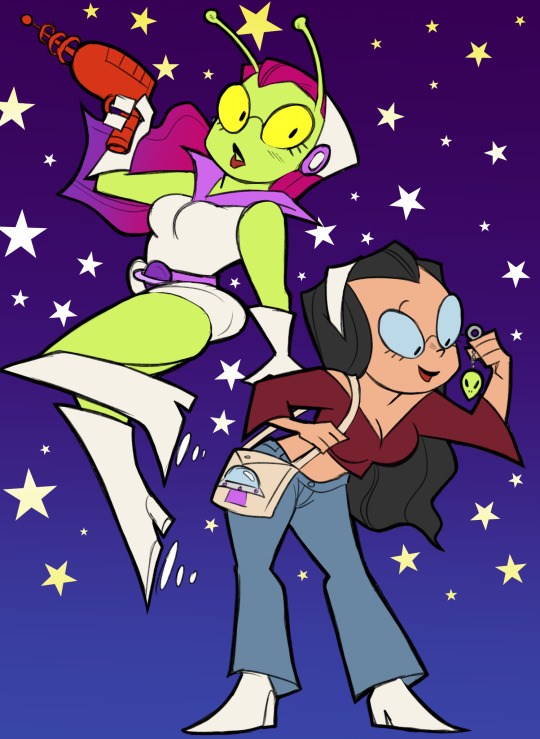
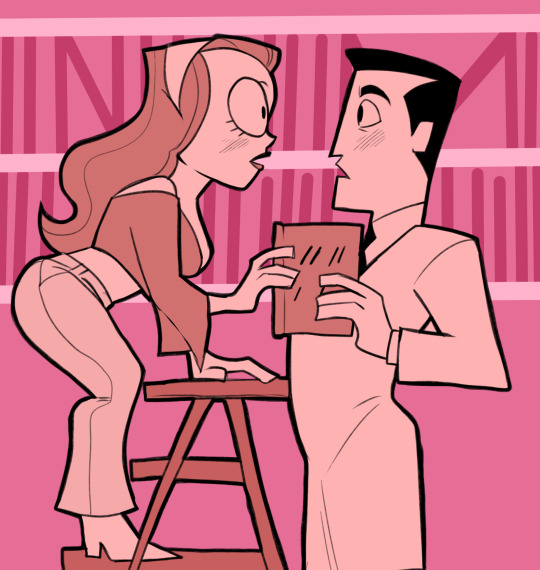
Uhm uh uh...I have no excuse for this 😔 PPG self insert who is secretly an alien! I imagine her intro episode would have her having a little romance with the professor when he comes into a bookstore she works at/owns and the girls being (rightfully, given the prof's dating history) suspicious of her. Wacky capers ensue where they try to prove that she's up to no good, only to find that she genuinely is just chilling and wants to live a normal life on earth!
Well, normal as she can, now that she knows this family! I think she'd fit right in 😉
Taglist♡: @crushes-georg @changeling-selfship @me-myself-and-my-fos @tiny-cloud-of-flowers @sunstar-of-the-north @dearly-beeloved @adoredbyalatus @squips-ship @cherry-bomb-ships @miutonium
#artfarts#self insert#self ship#self shipping community#self insert community#oc x canon#self insert x canon#the powerpuff girls#professor utonium#crush: 🔬#ngl im not exactly sure why i chose alien i just thought itd be cute and aliens were on my mind#and i was remembering a little song that i learned in elementary school called interplanet janet :3#and i was talking to asuka about it and tbhhh#ok listen#being an alien as an allegory for my autism is SUPER fitting#and tbh the professors pretty dang autistic himself 😂😂#i think being able to connect and relate to someone based on the ways they DONT fit in would be rly sweet 👉👈#idk if its bad representation to have the reveal be that shes an alien but idc#this is my self insert and IM HAVING FUN#but them bonding over misreading social cues and the urge to infodump and being able to listen to each other!!#and all the little quirks she'd have would be ones i have too 😂😂#like sometimes mixing up parts of words so they come out reversed#and lots of other stuff waaah#im hungy i gotta make dinner soon#but this is the result of watching nothing but ppg for like 3 days 😂😂😂
324 notes
·
View notes
Text

so do people like rainworld-ish fan songs
#tumblr made it quieter agh#this isnt supposed to mesh with the ost and instead be a representation of the sort of Awe i feel about iterators#my opinions on the result are. mixed#but cant hurt to post. maybe itll resonate with someone?#if i dislike it later ill just delete it#my music
324 notes
·
View notes
Text
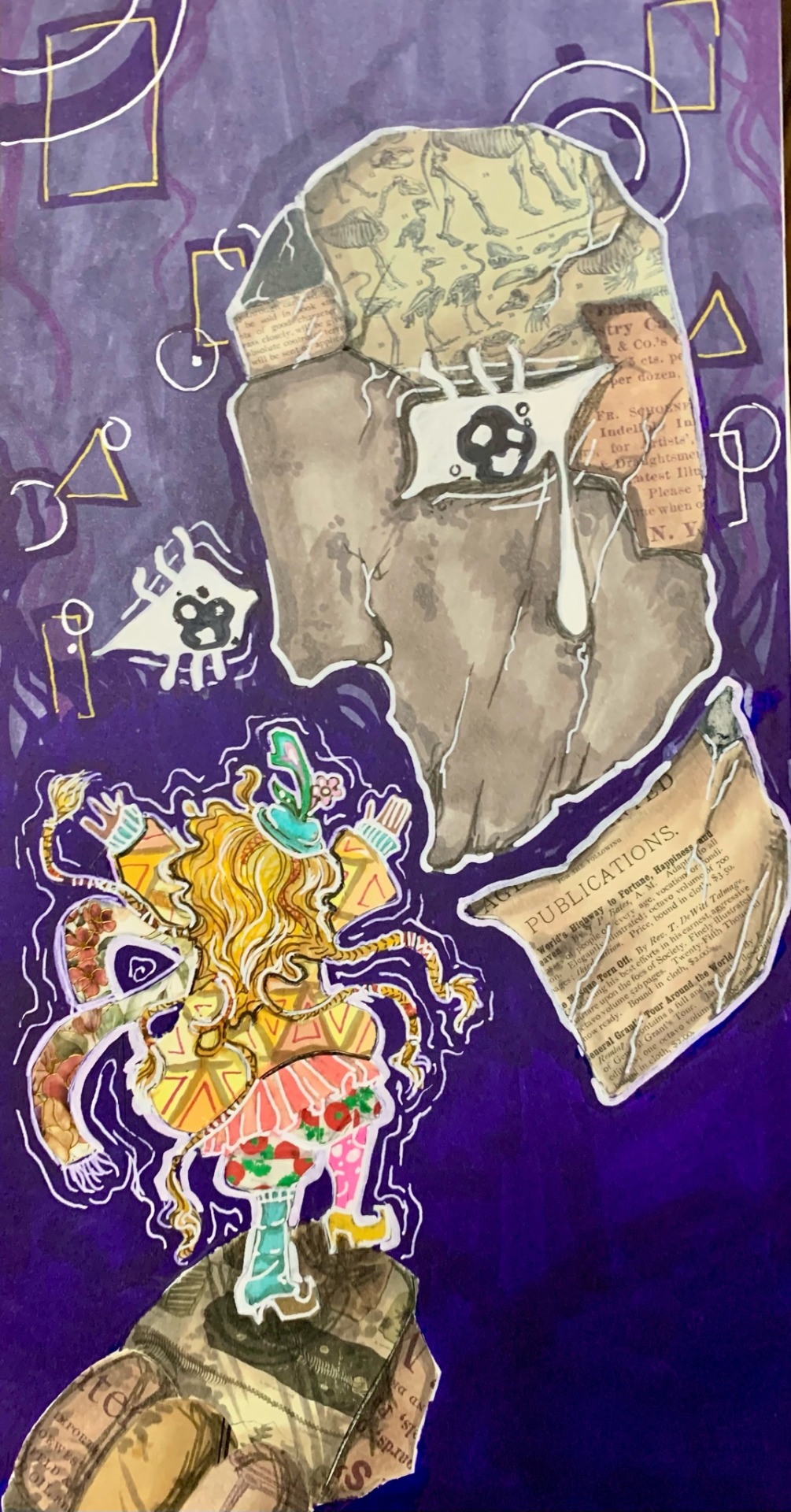
For ever and always my Sweet freind!!
#my art#huzzle mug#bauhauzzo#human huzzle mug#disorganized speech representation!!!#love to see it#great god grove#game if all time#love love love#mixed media
122 notes
·
View notes
Text

a little gouache illustration inspired by a very beautiful scarf that appeared on my pinterest feed 🌷✨
#my art#illustration#artist#artwork#artists on tumblr#traditional art#sketchbook#traditional illustration#mixed media art#muslim representation#muslimah#hijabi#hijabfashion#muslim artist#himi gouache#gouache painting#gouache#tulips#character illustration#character art#original character
71 notes
·
View notes
Text
I'll be honest, I'm going to sound probably all over the place with this, but I tried my best!
Okay, so going back to chapter 252, I see that Yuta was indeed sliced by Sukuna, but what I wasn't expecting that would resort to him being sliced in half just as Gojo was back in 236.
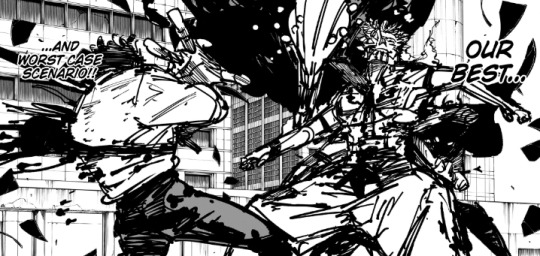
This is where it got confusing to me. How was Yuta sliced in half? Why was he sliced in half? Before this, just like Yuji, he was tanking Sukuna's cuts and using RCT. Just before this moment, Sukuna was also hit with Jacob's Ladder and his guard is at his lowest.
Did Sukuna manage to actually execute a slash that could completely cut through at that specific, odd moment and Yuta couldn't stop it? Or... did Yuta let it happen?
What if Yuta is just... tired?
I know, I know!
Like, I don't know, it just seemed odd to me.
It gets me that in 262, they state that their plan is that if Satoru loses and dies, his body will be taken over by Yuta, but... that was it. No one said anything that in order for Yuta to take over Satoru's body that he (Yuta) had to be mortally injured.
He could have switched his brain without being on the verge of dying, right? Which makes me question when Kenjaku uses the technique, does Kenjaku have to be close to dying to body hop?
That's for another day!
I recently (last week) rewatched JJK 0 and watching the beginning of that movie reminded me just how depressed he was and how little of himself he cared for. Yuta tried to off himself.
Also take note that he is constantly amazed by whatever his friends do. Evident enough against his fight against Geto. In 261, he shifts the attention back onto the topic of Gojo when Maki remarks how he's important to him, too. His reaction is highly negative.
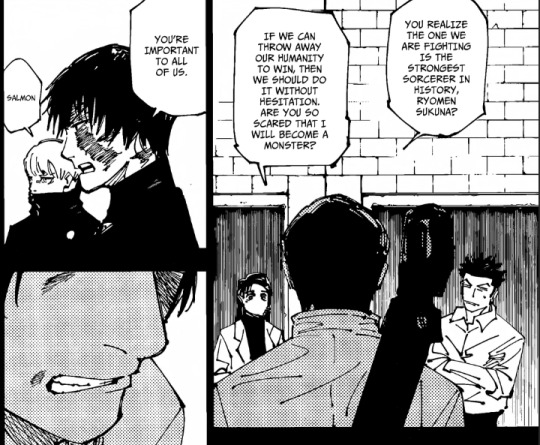
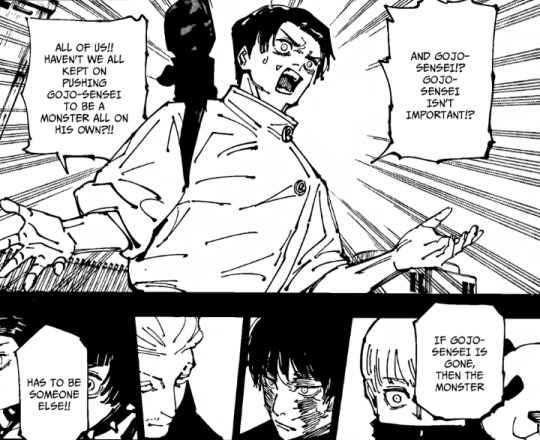
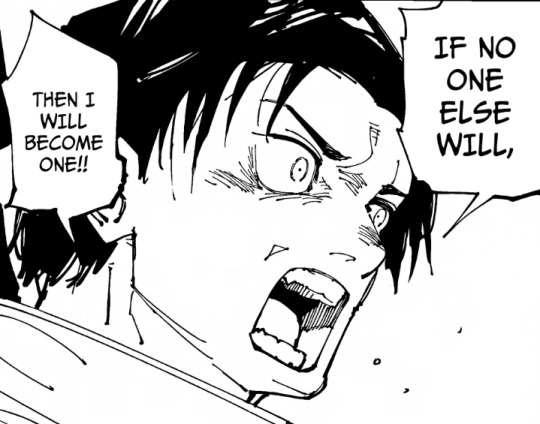
He gets angry, and thinking about what Maki said, I feel like that has a double meaning. Yuta is important because he is a friend. But he is important because he is also a weapon. He is the best player after Gojo that they got, he's the strongest after him.
It's almost feels like this is the moment Yuta decided to just throw it all out the window and take that risk because he was tired, but at the same time he wasn't just going to leave the others hanging.
This chapter does feel a little like the ending half of Shibuya. Yuji is once more unable to finish off the enemy that has been constantly terrorizing him because of an interruption by someone with a technique that allows them to use other techniques and just so happen to arrive possessing the body of a Special Grade sorcerer.
But let's go deeper into this, because when you think about it... Yuta is the Yuji in 261.
There are people dying around him after Gojo is out of commission in some way because of a dark haired villain who again uses the techniques of someone else! Both Yuta and Yuji had Gojo on the mind, but disregarded themselves, however there is a difference. Yuji's main goal was to save Gojo, Yuta has to use Gojo's body.
Here's something else about 261. Yuta is also like Kenjaku here. Both choose to possess a body because the technique engraved in the body is useful.
However, in opposition, Kenjaku willingly seeks out to do this. Kenjaku wants to do this because it benefits Kenjaku. Yuta doesn't want to possess Gojo's body, it's not something he is at all happy about. It's not something he ever dreamed of doing.
While this chapter is similar to the Shibuya Incident, there's bits where it mirrors Shibuya but distortedly. Kenjaku gets away with Gojo at the end of that arc. Here? It's not looking too good for Yuta. (I do believe in him though. I do feel like he will indeed accomplish something here.)
It's reminded that Yuta's technique allows him to copy a technique for five minutes. When Mei Mei points out the three possible outcomes of Yuta's technique timer running out, two of them has a result that may lead to death. Only one doesn't, and that's living on in Gojo's body.
So Yuta knows that he has a possible higher chance of dying possessing Gojo's body.
There's also the case of taking over Gojo's body to use his techniques was a last resort when everyone else was wiped out. When Yuta arrives back on the battlefield, Yuji had his claws right in Sukuna's chest. Yuji probably would have easily ripped Sukuna's heart at that moment had not Yuta showed up.
And I know, I know some Yuji's fans wanted that, I definitely would have loved to have seen that (payback), but I think back to Yuta's words in this chapter and overall what has happened.
Everyone, at some point, had to shed that bit of their humanity to win their fight.
It takes a curse to kill a curse. This is literal and figurative to the story. To be a jujutsu sorcerer you have to shed some bit of yourself to kill a curse.
This whole time, Yuji, probably the most human character (how ironic) has little by little shed his humanity as the story progresses. He's losing himself.
What if Yuta caught that? While we know Yuji didn't know some of the plans doing on, we can guess it wasn't the case vice versa. What if Yuta knew about everything or most of what Yuji had to do to get to where he is?
What if Yuta coming in right as Yuji was about to rip out Sukuna's heart was him saving Yuji from losing that last bit of humanity he has? Keep in mind that Yuji and Sukuna mirror each other, so ripping out his (Sukuna's) heart would make Yuji no better than Sukuna.
Shibuya was the start of Yuji truly believing himself to be less of a human. Chapter 261 mirrors Shibuya in some regards and I feel like the next couple of chapters may be Yuji seeing himself as a human, not a cog, again.
What if for the next chapters during Yuta's second confrontation with Sukuna, Yuji may get that hit of morality back when he learns what Yuta has done, he'll reflect on it and think about himself? What if once he learns what Yuta has done he gets a "do I want to be like that" moment?
I don't know, I don't know. But I feel like this...
Yuta is tired. He has those dark shadows under his eyes that make him look physical tired, but what if that is also a connotation/visual way of saying that Yuta is tired of how his life is now?
He acts like he's in a better state than how he really is and maybe this whole time, he just wanted to let go. He puts on this show though because he doesn't want the others to fret over him and snapped when Maki said he was important to them. He no longer felt like a human. Just a monster, a cog to the system... a curse, if you will. He accepted death when he knew there wasn't a high chance of escaping it.
However, he chose a moment that was "Hey, I'm going to die and I accept that, but you (Yuji) I'm giving a chance". I'm sure he knew about Gojo's plan to wanting a better future for the next generation. He's continuing to pave a way for that generation. Yuta's giving Yuji that chance to still be human, something he feels he can no longer be. He's been in Yuji's shoes, so he certainly know the path Yuji may be heading. Yuta may have the intentions to stop him heading in the same direction he and Gojo were steered into.
This may be Yuta's way of helping Yuji break that cycle.
#thinking about how gojo told him he's twice as blessed#for having the blood of two opposing families#but what if yuta having a mix of that blood is a representation of his inner turmoil?#that's just me#i wrote this like... I've been working on it since thursday and my mind has been all over the place#just kiya's thoughts#jjk#jujutsu kaisen#jjk spoilers#jjk manga spoilers#jjk 261#okkotsu yuta#yuta okkotsu#okkotsu yuuta#yuuta okkotsu#yuji itadori#itadori yuji#yuuji itadori#itadori yuuji
128 notes
·
View notes
Text
Whenever someone makes a sans WHITE I get overly angry like WDYM HE'S WHITE AND NOT BLACK. WHY ARE U WHITEWASHING HIM HOW IS HE WHITE IN ANY WAY SHAPE OR FORMEBWHAT
#white person here hi guys#white people have too much representation already#can we please acknowledge that all sanses are black/mixed (CROSS IS MIXED I WILL FIGJFPEOPLR#human designs for sanses are super interesting
83 notes
·
View notes
Text

SONA DESIGN RAHHH fennec fox as suggested by szare <3
#shes cute methinks#still very very proud of the jade hand idea#how are those glasses suspended you may ask#thats for you to decide bestie i have no clue#im pretty happy with this design !!#shes not a 1-to-1 representation of me but i took the parts of myself that i like best and mixed it with silly fantasy stuff and such#i didnt go full furry for two reasons:#1. i was not about to learn how to draw and stylize animal faces that’d take me another three months#2. lest (arcane) <3#shes so gorgeous okay#my art#sona art
23 notes
·
View notes
Text
As a mixed race person I want more angst about Spock being “a child of two worlds”
More Spock angst about him not fitting in on Vulcan or on Earth, how both cultures are so close yet so far in both directions and how even if you try to “pick one” to grow up with, you still end up with regrets of not honoring/feeling ashamed of the other.
More Spock angst about growing up not knowing anyone else like you, and even when you find a place that embraces diversity you still feel like the odd one out.
More angst about not being able to please both parents/guardians because you’re too much like one culture or the other
I know there’s an alright amount of it out there but I crave MORE
-more below the gif————
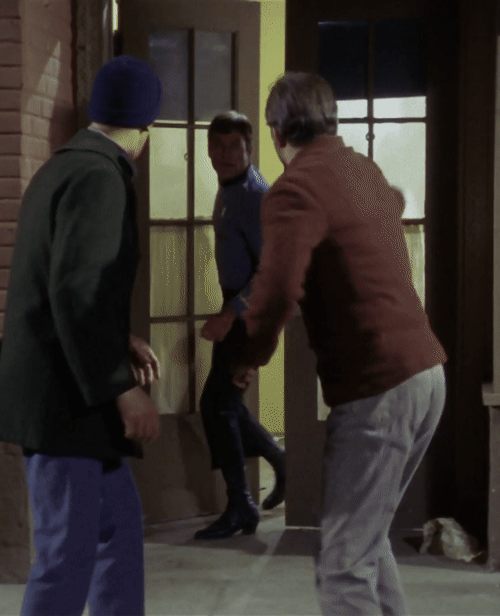
***Also anyways in the gif bones giving Kirk a hug and pat on the back while Spock gets nothing hurts me (even tho bones and Kirk have known each other longer so it makes sense but still 😭)
The city on the edge of forever meant so much to me as a kid because it highlighted that despite the fact that Kirk was also out of place with his clothes, Spock was THAT MUCH MORE out of place because of how his body looked (as opposed to clothes which can be changed) that he hid parts of himself to fit in more…
(It also means a lot because this episode Kirk tries to explain Spock’s ears as him being in a rice picker accident and that Spock was Chinese— which yeah is racist asf but as a kid I actually thought Spock was Asian and related to him a little bit more because of that lowk since he woulda been half Asian-half white like me (since the ears were the “Asian” portion and that’s one of Spock’s Vulcan features?? And his mom, Amanda, is white; Idk it made sense to 10 year old me)
Anyways I love him and his identity
#s'chn t'gai spock#spock#tos spock#spock/kirk#star trek spock#star trek#Spock is the character I most relate to in any media anywhere#I’m half Asian and half white and the whole thing with controlling your emotions and also being ashamed of one part/growing up in one coun#country vs the other feels so awkward when you meet people that arent mixed (most) from the same place#and whether or not you know the language#mixed race representation about feeling like an outsider no matter where you go#I love him sm#Spock the icon you are#and he’s queer asf so bonus points#green-blooded hobgoblin like huh#but also#explore more angst#it’s horrible but accurate#…I feel bad for him but I want to feel seen
26 notes
·
View notes
Text
the Lower Decks/SNW crossover really dared to ask the question of what would happen if Starfleet’s most autistic soldier got thrown right in the middle of his special interest
#star trek#star trek lower decks#star trek strange new worlds#Star Trek strange new worlds spoilers#bradward boimler#then they also threw starfleets most adhd soldier into the mix#'everyone talks so SLOW and QUIET its WEIRD' babes youre extremely neurodivergent#tbh i was NOT expecting this to mostly be a boimler episode I thought mariner was going to get the spotlight but yknow what good for him#it makes sense tho i think Boimler is a character that feels very much like a representation of fandom and like#him pointing out people being ooc and the POV shots just sort of confirmed it LMAO
260 notes
·
View notes
Text
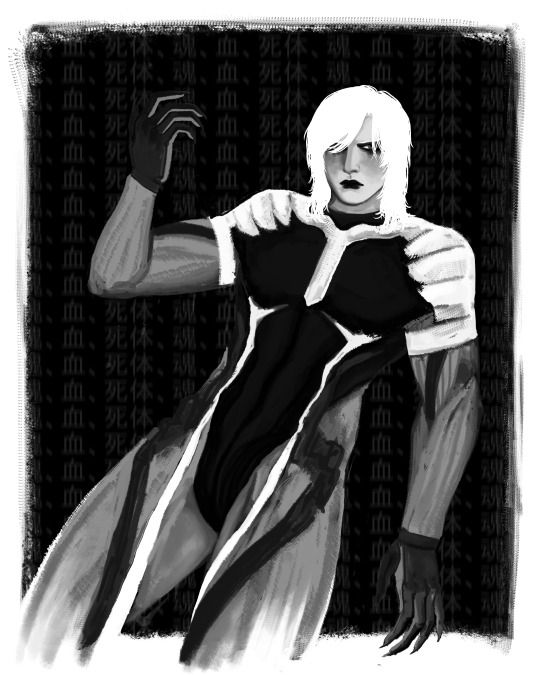
#魂、血、死体 = soul - blood - corpse#(at least that's what i wanted to write)#i mixed up his skull suit & his mgr cyborg body#(my thoughts being some sort of representation/alter of jack the ripper as someone who's always been there)#(also i just don't have the mental strength to do the whole cyborg design but shh)#metal gear#metal gear solid#mgs#raiden#Spotify
60 notes
·
View notes
Text
Representing Biracial Black South American Experiences…Through a White/Asian Mixed Race Character in Europe
@colombinna asked:
I have a YA story that's in very early development - pre-alpha, if you will. For now what I have developed is the characters: one of the MCs is a biracial asian queer girl (her dad is thai-american and japanese, her mom's white), she has a medium/dark brown skin, and lives in a very white context in a fictional European country. The contact she has with her extended family is limited to phone calls and regular visits because her dad moved from the US to said fictional European country.
I'm a biracial black queer girl myself, living in a very white community in South America, my extended black family also lives in a different place, and I'm taking a lot of my experiences of being not white and queer whilst living in white communities into her story (the feeling of not belonging, the impostor syndrome, standing out as one of the only POC kids in class, etc) and thinking back to what I've heard asian friends and classmates say about their experiences in the same school/community context as mine. But I want to know how different her experiences as a dark-skinned asian girl would differ from mine and my friends' in a similar context (white community, small number of other asian people - and POC in general - in the social circles, and limited contact to her extended family), and what experiences could make sense if the character was biracial black like myself, but won't if she's biracial asian.
Why not write a biracial Black girl if those are the experiences you want to represent?
This MC is straddling, like, 3 different cultures. Having multiple immigrant identities in not-Europe is not the same experience as being Black in South America; while both are complex minority experiences, there are too many differences in intersections and histories to compare. Not to mention, it really depends on what European culture(s) you’re basing your not-Europe on.
I think you’ll find that the written result will ring much more genuine and rich in depth if you either translate your experiences more directly or pick a more narrow focus, instead of assuming that there is a universal for racism and colorism against biracial people that is transferable across contexts. Because there isn’t. There can be overlaps, but if you’re looking to cover the entire range of What It’s Like in general, it won’t work.
This isn’t to say that people can’t use other identities to write about specific experiences of their own, but in this case you need to think about what story you want to tell and what your reasons are. Marika’s commentary will go more into when and how this can be done effectively.
Also, if the point is to make her a dark-skinned Asian, as a white/asian mix myself, I implore you: why must you make her 1/4 Japanese and 1/2 white? Even with the Thai ethnicity thrown in, Thai people very much range in skin tone and have their own domestic issues with colorism. It’s not impossible for dark-skinned examples of your MC’s ethnic makeup to exist, but still I don’t recommend it for two reasons:
It's going to make researching people whose experiences fit that much more difficult. Most experiences of colorism, othering, and other forms of discrimination that mixed white asians tend to face are completely different from mixed race asians who tend to have darker skin & features.
There's enough Japanese & white mixed Japanese rep in the Asian rep sphere as is. Consider that this individual could be mixed Asian (not Japanese) with something else (not white)!
But again, think over your motivations. I’ll spare you the copy/paste of our Motivations PSA, but re-read it and consider. Why do you wish to write a mixed Asian character to tell the story of your experiences as a mixed Black individual instead of a mixed Black character? What does it add to the story? Is it an effective vessel for the experiences you want to convey?
~ Rina
I think Rina brings up some good points here: I’m not hearing a lot of specificity in your query. As you doubtless know firsthand, the more intersectional and complex an identity, the more of a chance the identity may come with unexpected baggage and nuances that fly in the face of what is common sense for less intersectional identities. This can make writing such characters challenging just because there is so much choice on which identity themes to emphasize.
I once spent about 15 minutes explaining to a person the thought process I used to determine when I could wear jeans depending on which country I was living in as a mixed race person who is perceived as different things in different places. It might seem trivial, but it’s actually very important to me for the purposes of identity, safety and gender presentation, so I personally think it’s interesting. But will my readers think a character’s multi-page internal monologue on whether or not to wear jeans is especially compelling? Does the writer-version of me want to research the version of myself musing on my specific jeans conundrum to that extent? Or do I want to talk about other things related to attire a lot of other people would relate to? I think those are all YMMV questions, but hopefully, they provide some perspective that will help you be intentional about how you might want to tackle something potentially very time-consuming.
When I say intentional, I mean that when covering a complex identity with which you are peripherally familiar, it will always be more effective and easier to use it to tell a specific story extremely clearly than to be extremely broad in scope and try to include almost everything about your own experiences, especially because some of those experiences might not be as relevant for your character’s background as they are to yours.
One of my favorite childhood picture books is written and illustrated by a Nikkei writer-illustrator team. The book is titled Ashok by Any Other Name (link). The story features a desi child growing up in the US who wishes he had an American name his friends and teachers wouldn’t think was strange. It covers how being othered for his name makes him feel, and how he copes with that feeling. Speaking as someone both Japanese and desi, I think through the plot device of names perceived by the majority of Americans as foreign, this book aptly shows how many immigrant/diaspora creators are capable of relating to the pressures of assimilation experienced by other immigrant, even if the creator, the audience and the story’s subject’s backgrounds all don’t completely overlap 100%.
There will be aspects of your Blackness, mixed identity, skin color, sexuality and living in a local community lacking diversity as a member of many minority groups that you will find resemble/ resonate with the experiences of mixed-race, Japanese individual in a Europe-themed setting, and I think any story that leans into those themes will be considerably easier for you to research. In other words, instead of asking us “How does my experience differ?” I would approach this issue by deciding what narrative you want to show about your own experience and then research the specific contexts within which your desired story overlaps with elements of mixed-race Japanese experiences.
- Marika.
#japanese#mixed race#biracial#black#black woman#asian women#multicultural#multiracial#pov#identity#representation#asks
397 notes
·
View notes
Text
Bro I just became a luke hughes fan! he’s so underrated best hughes brother by far!

#luke hughes#hughes brothers#hockey#new jersey devils#devils hockey#nj devils#jewish#love me some good jewish representation#mixed religion household twinsss#he’s so me if I was a 21 yr old hockey player#in another life I went to Umich
36 notes
·
View notes